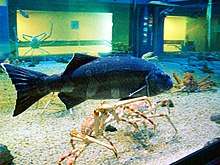Skilfish
The skilfish, Erilepis zonifer, is one of two members of the fish family Anoplopomatidae and the only species in the genus Erilepis. It is also known as black cod, though they have no relation to cod, family Gadidae, and sable fish or sablefish, which is a name commonly used for other species in the family Anoplopomatidae. Found on deep rocky bottoms in the North Pacific at depths of up to 440 metres, they can reach up to 1.83 metres in length and weigh up to 91 kilograms. Young fish display striking white blotches on their body, however their colour changes to dark grey with maturity, and the bright markings become duller and less visible as they grow, similar to the Tiger shark's stripes.
| Skilfish | |
|---|---|
 | |
| Scientific classification | |
| Kingdom: | |
| Phylum: | |
| Class: | |
| Order: | |
| Family: | |
| Genus: | Erilepis T. N. Gill, 1894 |
| Species: | E. zonifer |
| Binomial name | |
| Erilepis zonifer (Lockington, 1880) | |
Description
Skilfish are large and bulky fish, which bear a resemblance to the wreckfish in the family Polyprionid, and the groupers or sea bass in the family Serranidae, although skilfish are not related to any of those families. They are very long-lived fish, with some caught specimens being over 90 years old. Skilfish have a dark colored body, with almost black fins, and large, blue eyes above a projactile, cavernous grouper-like mouth. They also have strong caudal fins, which are as tall or taller than the fish's head. Skilfish can grow to a length of 1.83 m, and a weight of 91kg.
Biology
Skilfish are the predators of a large number of bony fishes, such as eels, capelin, Pacific cod, pollock, candlefish, herring, mackarel, mullets, cephalopods like squid, octopus, crustaceans such as shrimp, small crabs, and they may also consume jellyfishes and eel leptocephalus. Rockfish may be also prey, as one dissected specimen had a stomach full of rockfish spines.
References
- "Erilepis zonifer". Integrated Taxonomic Information System. Retrieved 24 January 2006.
- Froese, Rainer and Pauly, Daniel, eds. (2005). "Erilepis zonifer" in FishBase. 10 2005 version.